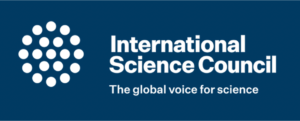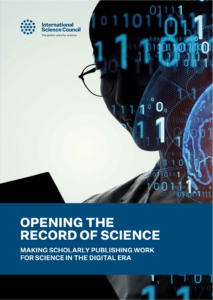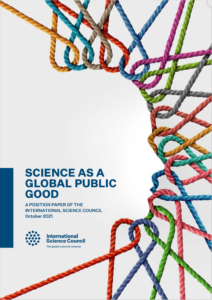Calls to open the record of science and build a more equitable knowledge sharing ecosystem are intensifying worldwide.
Ratification of the UNESCO Recommendation on Open Science in November was a major milestone, and set up the first-ever global standard-setting framework for international open science policies and practices. It proposed global action to transform and democratize science.
 To achieve open and equitable knowledge sharing, the International Science Council (ISC) endorsed the need for urgent reform and identified fundamental principles for efficient scientific publishing systems. The principles were spelled out in the Opening the Record of Science: Making Scholarly Publishing Work for Science in a Digital Era report produced by the ISC Future of Scientific Publishing project.
To achieve open and equitable knowledge sharing, the International Science Council (ISC) endorsed the need for urgent reform and identified fundamental principles for efficient scientific publishing systems. The principles were spelled out in the Opening the Record of Science: Making Scholarly Publishing Work for Science in a Digital Era report produced by the ISC Future of Scientific Publishing project.
Efforts are now underway to turn these aspirations for change into reality. With many of the 193 countries that signed on to the UNESCO recommendations seriously looking for ways to set up open science processes, the time is ripe for action.
This involves a push to educate stakeholders from researchers to administrators and funders on the value of open science. It also requires revising the incentive structure to recognize the contribution of open scholarship.
Those leading the transformation say campus leaders, including librarians and administrators, have a role to play in advancing this new paradigm. And there is growing consensus that the time is right to push for a more balanced ecosystem that puts the interests of science – and the public – ahead of commercial profits.
“We’re now moving to the point where we’re creating a community, identifying priorities, and acting,” says Geoffrey Boulton, chair of the ISC’s Future of Scientific Publishing Project. Next  steps were outlined in a working paper recently published by the ISC, “Opening the Record of Science: Priorities for Reform of Scientific Publishing.” Boulton says the ISC would like to work closely with SPARC and other organizations to help design a new approach to knowledge dissemination that primarily serves the public good, as envisioned in the ISC paper Science As a Global Public Good. He maintains that changes to the journal process are vital to ushering in open science.
steps were outlined in a working paper recently published by the ISC, “Opening the Record of Science: Priorities for Reform of Scientific Publishing.” Boulton says the ISC would like to work closely with SPARC and other organizations to help design a new approach to knowledge dissemination that primarily serves the public good, as envisioned in the ISC paper Science As a Global Public Good. He maintains that changes to the journal process are vital to ushering in open science.
“Publishing isn’t just a useful add-on to the scientific enterprise. It’s absolutely in the core of doing science,” Boulton says.
The transformation will also involve policy change – for instance, universities passing internal regulations (as the University of Edinburgh recently did) encouraging faculty not to forfeit their copyright to publishers. “Almost all of the work that we are concerned with is funded from the public purse,” Boulton says. “It is quite inappropriate to freely gift a publicly funded asset into private hands. That’s inappropriate.”
Shifting to open also means valuing preprints. Boulton points to recent research (Tracking changes between preprint posting and journal publication during a pandemic (plos.org) and Examining linguistic shifts between preprints and publications (plos.org)) in which artificial intelligence technologies compared papers that had been produced as preprints, then subsequently published by commercial journals and which appeared to show almost no difference. The difference was in cost: depositing work in a preprint repository was a fraction of the expense of publishing in a journal.
The current system of commercial journals perpetuates global inequalities, and are at the heart of the need for reform.
Open access is not just about facilitating access for readers; it’s also about ensuring the ability to contribute to the record of science for all potential authors. There is deep concern that the advent of article processing charges (APCs) has furthered this divide. Vital scientific knowledge remains locked behind expensive paywalls, out of reach to researchers working in many low- and middle-income countries and many who could benefit from research findings. And APCs have introduced new barriers to those who simply can not afford to pay them.
“We need to build a global commons of scholarship,” says Ahmed Bawa, a theoretical physicist and chief executive officer of Universities South Africa, who serves on the ISC committee examining the future of scientific publishing. “Many of the grand challenges we are facing are both intensely localized and intensely global. It would be a huge disservice to humanity, if we end up with the science systems that are balkanized.”
To move the needle on open science globally, Bawa says the case needs to be made to a broad swath of organizations and funders. This will require education on the value of open, culture change, and adjustments to promotion systems. Universities can help by engaging faculty and providing clear information about open practices. It’s important to convey the benefits to the larger research community to get buy-in, Bawa adds.
Recently in South Africa, a draft national open science policy was released that would require all publicly-funded research conducted in the country be published in open access journals. Bawa notes the need for public support of science if these measures are going to gain traction.
There is also an increasing movement to get more early career researchers at the table in pushing for reform. Many have the desire to operate in the open, but the promotion and tenure systems that they must advance through are not yet meaningfully supportive of this way of working.
 “Young researchers are trapped. They see the future. They use the future in all daily life. But they have to accept the rules of the game that reward publishing in so-called high impact factor journals,” says Dominique Babini, open science advisor at the Latin American Council of Social Sciences (CLACSO), and a member of the ISC project steering group. “They know how to do it better, they support OA, but they cannot apply it. We need to change the evaluation and reward system and CLACSO´s Latin American Forum for Research Assessment (FOLEC) is participating in the ISC-GYA-IAP joint project on Science Evaluation Systems. (See ISC report on Evaluating science as a global public good.)
“Young researchers are trapped. They see the future. They use the future in all daily life. But they have to accept the rules of the game that reward publishing in so-called high impact factor journals,” says Dominique Babini, open science advisor at the Latin American Council of Social Sciences (CLACSO), and a member of the ISC project steering group. “They know how to do it better, they support OA, but they cannot apply it. We need to change the evaluation and reward system and CLACSO´s Latin American Forum for Research Assessment (FOLEC) is participating in the ISC-GYA-IAP joint project on Science Evaluation Systems. (See ISC report on Evaluating science as a global public good.)
Latin America has long been an example of how scholarly communication can work in the public interest. Babini says the region is working to strengthen the acceptance of the “diamond” open access model (no charge to read, no charge to publish in open access) and its interoperability with university repositories.
The current global publishing system cannot continue with paywalls to read or to publish, indicators for research assessment which exclude a high percentage of research outputs because of language, contents from research agendas of no interest for mainstream journals, and other practices that don’t contribute to diversity and equity, Babini says.
After advocating and implementing open access for more than 20 years, Babini says it’s the first time that she has seen a consensus of international organizations related to science calling for reform in both publishing and research assessment.
“With the UNESCO Open Science Recommendations, it’s so clear that the global research agendas need more voices than a reduced privileged group of research institutions,” Babini says. “We need diversity. We need multilingualism. We need so many new perspectives, because if not, open science has no future. Now is the moment. We need to act now.”
On campuses, the transformation can include developing open access journals, repositories and platforms to circulate and preserve digital open access content, she says. Libraries can train researchers to use open access publishing options and promote policies to increase use of open access and research outputs.
Adds Babini: “University libraries are at the heart of scholarly communications worldwide and they play an important role in support of this openness.”